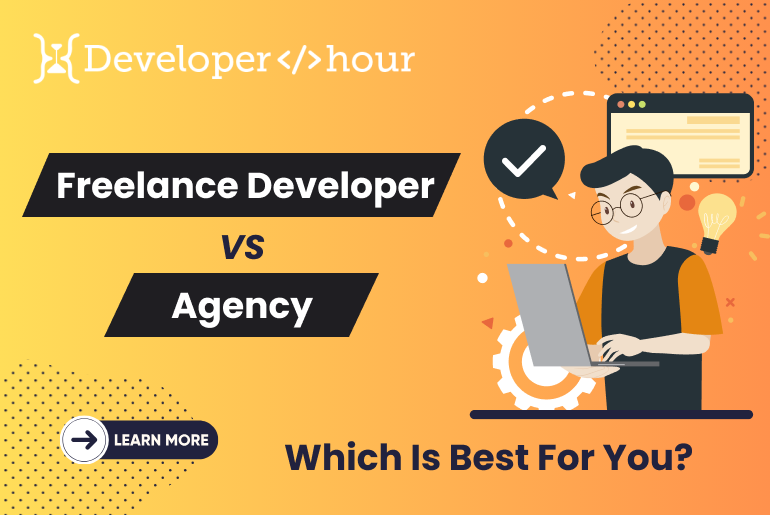In today’s digital world, businesses often struggle with deciding whether to hire a developer from an agency or work with a freelancer to expand their team. Each option has its pros and cons that can greatly affect project outcomes.
When choosing an agency vs freelancer, businesses need to keep in mind that there can be a huge difference in the approaches and capabilities of the two. An agency works with a multi-faceted team with diverse skillsets, while a freelancer is mostly specialized in a niche and has the ability to deliver within a certain area of expertise.
Let’s start by examining the main differences between hiring a company or a freelancer to make it an easy bet for you!
Benefits of Hiring Dedicated Developers From an Agency
- Professional Expertise: You not only might manage to use the services of various agencies but also you get talented people around you, with specific expertise. These teams are usually good at the most recent technologies, latest trends, and best working practices. As a result, they always tend to offer the best quality or innovative solutions for projects.
- Resource Scalability: Additionally, agencies have a knack for allocating extra internal resources in a snap for any task resulting in on-time delivery and adaptability to the dynamics of a project. It is possible to add more developers, designers, or quality assurance specialists to your team at a higher rate than the in-house model to handle any project-related requirements or schedules.
- Structured Processes: The agencies implement properly defined workflows, quality controls, and project management approaches which means that the entire development process is simplified and the risks are reduced. They usually develop an ultra-efficient Project Management Discipline. Project managers work on dedicated tasks that do not need your attention like supervision, communication, and coordination.
- Accountability and Support: By hiring developers from an agency, you will enjoy these added advantages, such as technical assistance, responsibility delegation, and guaranteed after-execution assistance for your project. Unlike freelancers, who can leave suddenly and unexpectedly, agencies have established partnerships and collaborations and therefore offer more sustainable and dependable choices to work with.
- Long-Term Support and Maintenance: Along with after-task maintenance, companies frequently offer additional services for project completion. More than that, it involves the diagnosis and fixing of problems, the writing of updates, the implementationtion of improvements to ensure that your software operates optimally.
- Collaborative Approach: Agencies build collaborative workflows where clients feel heard and the input is considered and incorporated throughout the development process. This is critical to preventing your final product from deviating from your vision and to meet the business goals you intend.

Disadvantages of Hiring Dedicated Programmers from a Company?
- Higher Costs: When you hire developers from a company, it may cost up to 20% more in comparison with the freelancers. Agencies offer management services and specialized teams to address various project aspects, but these services come with an additional cost, which is included in their charges.
- Less Control Over Individual Talent: When you get help from an agency, there is a chance that you are going to have less room for choosing technical developers for a particular project. Agencies place workers on projects that require them based on when they are available. So, a manager cannot hire developers that they want to work on the project like a freelancer.
- Communication Challenges: When hiring developers from a company, direct communication can be reduced due to the involvement of project managers and multiple team members. This organizational structure may result in delays or ineffective communication compared to the direct interaction experienced when working with freelancers.
- Dependency on Agency Availability: Agencies work on multifarious projects, which may lead them to be unavailable, as this availability varies according to workload and resource allocation provided. With this, there can be an impact on project schedules and how fast they can work to solve existing problems.
- Complexity in Scaling Down: Scaling down when working with development agencies can pose more challenges compared to scaling down with freelancers. Ending contracts or reducing teams may involve obligations related to contract terms and administrative processes, requiring certain efforts and involvement.
While agencies offer valuable benefits for software development, it’s important to consider these shortcomings and how they align with your project needs and budget before making a decision.
Benefits of Hiring Freelance Programmers
- Cost-Effectiveness: Freelancers usually charge low rates because they do not have as many costs of operating as agencies do, making them the obvious choice for any project that must meet some flexible budget.
- Scalability and On-Demand Availability: Short-term project outsourcing is provided through freelancers who can be commissioned for special action activities as the number of tasks can be scaled according to project requirements. Regardless of whether you need freelancers to help you out with individual assignments or ongoing work, they can make those works available for a short period without requiring a long-term commitment.
- Access to Diverse Talent: Freelance platforms offer businesses a wide array of talent pools that allow them to hire freelancers based on their work expertise and the skills they need. It is a mix of talent that allows businesses to hire specialists for narrow tasks or introduce new skills and technologies.
- Specialized Expertise: Freelancers are highly skilled in one field of expertise or domain and bring great depth to the project. They can offer you articulate service and perennial customized solutions to your tasks.
- Reduced Administrative Overhead: Hiring freelancers involves less paperwork than obtaining services from agencies. Multiple contracts or ongoing employment fees are not required in this case, thereby making the hiring process a snap and minimizing the usage of paper.
- Flexibility and Personalized Attention: Working with Freelancers assists with fast communication, immediate evaluation, and efficient project work. You can communicate directly with the freelancer which results in a faster way to make decisions, as well as adjust to project requirements as needed.
- Faster Turnaround Time: The agile and independent emotional intelligence of freelancers frequently is expressed in the speed of getting the work done swiftly. This results in faster delivery of project outputs, going a long way to help clients who have tight learning timelines.
Exploiting the benefits of hiring a freelance programmer, firms, on the other hand, can enjoy all the benefits ranging from flexibility, access to specific skills, and also cost savings which consolidates a free-lance application programmer as an incorporative option.

Disadvantages of Hiring Freelance Developers
- Reliability and Accountability: Sometimes freelancers can get turned down because they have too much work to complete what’s needed on your project. This is only one of the problems that can arise such as delays or gaps in communication. An individualized system could lead to trade-offs or even gaps in functionality when availability and priority issues come to the fore.
- Skill and Quality Variability: Qualities and levels of skill can be highly unpredictable from one freelancer to another so carrying out in-depth testing for each individual is of utmost importance when it comes to ensuring project success level. Although some freelancers do just a great job, others may lack professional skills or may end up with poor quality work, meaning that the management refining process is required.
- Lack of Long-Term Commitment: The freelance market usually deals with project-specific tasks without assurance of the duration frequently causing restraints in continuous support for project development.
- Limited Collaboration and Team Dynamics: Usually, freelancers are engaged in a one-man mission, which means a lack of communication with other workers and collaboration. Collaborations outside the chain of command may affect the project’s progress and engagement in crisis resolution.
- Dependency and Continuity: Using freelancers as the sole provider for a specific service may have some risks if they suddenly stop services or become unavailable. This can cause delivery timelines to be affected and there could be a potential risk to the project’s workflow and outcomes.
Freelancers in the workplace still face numerous obstacles, but as they can fill skill deficiencies or nail down short-term jobs it makes them a good fit in various business situations and project scenarios. Managing expectations, setting up an effective communication system, and a thorough vetting process may help to overcome challenges and risks.
Side-by-Side Comparison Table
| Aspect | Agency | Freelancer |
| Expertise and Professionalism | Teams with specialized skills | Individuals with varied skill levels |
| Cost | Higher due to fixed overheads and team structure | Potentially lower due to leaner operative practices |
| Project Management and Accountability | Structured processes and clear accounts | May vary; relies heavily on individuals |
| Flexibility and Communication | Standardized communication practices and functional channels | Direct and flexible communication |
| Resource Scalability | Easier to scale resources if needed | Scaling may be difficult |
| Risk Management | No significant project management and engagement risks | The project requires risk prevention and management measures |
Conclusion
Your project’s specifications, budget preferences, and risk appetite determine whether to hire a dedicated developer from agency or adopt freelancers. Agencies deliver professionalism, scalability, comprehensive project management support, and tent outlines while offering sustainable engagement models for projects of different sizes and complexities, however, these come at a considerable cost.
Conversely, choosing a freelancer as a development partner offers flexibility, cost-effectiveness, and specialized expertise. However, it comes with risks of reliability, scalability limitations, and potential communication challenges. Ultimately, the decision hinges on project scope, timeline, and budget constraints.
Balancing pros and cons ensures a tailored approach to maximizing benefits while mitigating risks in collaborative ventures.
FAQs
Ans. Consider factors like project complexity, budget, timeline, and the level of control you require over the development process. For larger, mission-critical projects, agencies might be a safer bet. For smaller or short-term projects, freelancers can be more cost-effective.
Ans. Vet freelancers thoroughly based on their portfolio, reviews, and skill sets. Conduct interviews to assess their communication skills and commitment. Start with a small project or task to evaluate their performance before committing to a larger project.
Ans. When you hire developers from an agency, it gives you access to specialized teams with a range of skills, efficient project management, and assuring accountability. Agencies provide professional expertise, scalability, and ongoing support for your projects.



